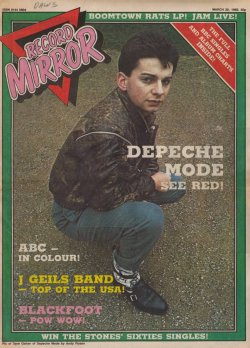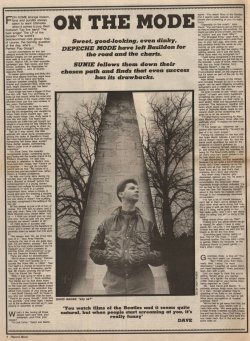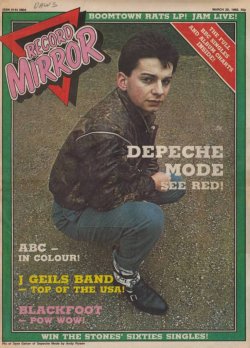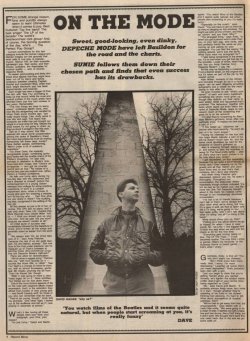On The Mode
[Record Mirror, 20th March 1982. Words: "Sunie". Pictures: Andy Rosen.]


ON THE MODE
For some strange reason, fans and pundits always seem to want Ultimates when it comes to pop. Best Guitarist! Top live band! The LP of the decade! The world’s best / worst / last rock group! And, of course, the burning question of the day, who’s… The Perfect Pop Group?
Current nominations for this last category include The Human league and Altered Images (on the grounds that what sells is true pop, ie popular, music); Haircut 100, for their exquisite, lightweight pop, their socks, and their braces; outsiders, the Associates for musical quality – and, of course, Depeche Mode.
So sweet, good-looking and dinky doo these boys appear that they might have been run off by Gerry and Sylvia Anderson between creating Captain Scarlet and Lieutenant Blue, while their hard, bright electronic pop has been phenomenally well-received.
Each single has been a bigger hit than the last, with “See You” promising to keep up that record [1], while the cruel and cynical scribes of the music press have afforded them just four bad reviews in two years. Remarkable!
“The only things we have got to worry about,” confesses Martin Gore, who now fills the songwriting role vacated by Vince Clarke some months ago, “are really stupid things. Like, Andy came in one day and said, ‘I’ve heard that someone we know has just bought our single in a local shop for 50p. Maybe the shop knows it’s not going to chart, so they’ve stuck it straight in the 50p rack’.”
Daft as it may sound, that little episode did cause some consternation among the ranks of Basildon’s finest. But more real pressures must be making themselves felt these days, surely? Dave Gahan agrees, commenting, “Mart’s under a lot of pressure nowadays.”
You know Dave, the instantly recognisable singer, combining quirky good looks with the lovable charm of the Pilsbury Doughboy. I’m later told, perhaps in retaliation to Mode’s nice-boys-next-door image, that “Dave’s an ex-spanner – he’s got his juvenile record and all that.” No traces of a bovver boy past are evident now, rather, there’s a modest confidence.
He tells one funny story during my two-day stay with the Depeches and that’s directed at himself: picture the embarrassment of a young Gahan released from college for some practical experience of work in a London department store, when a troupe of young girls spot him dressing a window. Isn’t he the boy who… Yes! ‘Ere, what are you doing in there?’ The budding pop star, recognised in the setting of his day job.
All this started as just a bit of fun, of course. The DPs laid no plans, and it was only when “New Life” charted that Mute Records boss Daniel Miller “told us – ‘I think you should give up your jobs now.’ And we said ‘are you sure?’ because we weren’t certain at all.”
An initial burst of success was immediately followed by the departure of Vince, who’d written all the songs and generally acted as leader from the word go. [2]
“We always said, ‘Oh, let Vince take care of it’,” says Andy Fletcher, “because the rest of us are quite lazy; well, me and Martin, anyway.” But now Gore is the chap under pressure: can he measure up to Clarke’s prowess at penning those ultra-commercial songs that are Depeche Mode’s hallmark?
Plans are afoot for diversification: “We’ve done a reggae song,” Fletcher tells me, “with horn sounds on it – sound like Acker Bilk, or UB40.” [3] “See You” itself is a change of mood for them, too, with its almost throwaway, gentle feel. Bit cheeky pinching the bit from “Then He Kissed Me”, though.
“Well, it was going to have a Jess Yates organ bit on it,” Gore confides, “but Daniel but his foot down there.”
One of the more bizarre aspects of life on the road with Depeche Mode (hated expression, that!) is the adoration they attract from hordes of very young girls – real David Cassidy stuff, for those of you who can remember that far back. “They’re too young, though,” Andy tells me, grumpily. “The other night I looked out at the audience and felt as if I was playing in assembly at school.”
What’s it like having all those people want your face, your autograph, your time, your kisses?
“It’s just funny,” David and Martin agree. “You watch films of the Beatles and it seems quite natural, but when people start screaming at you, it’s really funny.”
“Especially on the coach,” says David. “You just have to grin at them all, as they’re banging on the windows. You might just wink at one of them, and they go ‘ooooh!’ and you think ‘Why?’”
“The strangest thing,” says Andy, “Is when you get a person who’s older than you, or your own age, who looks, acts and probably thinks the same as you, coming up and asking for your autograph. You just feel like saying ‘I’m nothing special, we’re just the same. What d’you want my autograph for?’
“I hate being recognised in the street, too. It’s so bad when you get that tap on the shoulder. Loads of times, when they ask ‘Are you Andy Fletcher from Depeche Mode?’ I say ‘No’…”
All this may be becoming a nuisance, if not a distinct strain, on the original trio but it’s taken as part of the job by the newest arrival.
Alan Wilder, formerly of the Hitmen and recruited through an ad in a music paper, can be seen diligently providing autographs and a cheek for the more daring to kiss after the show.
He even troubles to ask “what’s your name?” of each and every supplicant, something the others have given up, though they dutifully put their name to each poster, ticket and fag packet that’s proffered. This behaviour, together with looks which stand out even within the ranks of Depeche Mode, reaps its own reward: most of the screaming that goes on is on his account.
“I’m glad they’re screaming for Alan,” says Martin’s girlfriend, Anne, after one particular show. “It makes him feel more a part of it.”
“If this keeps up,” observes her partner with mock-severity, “he won’t be part of it for much longer.”
Having his intended on the tour with him helps Martin tolerate a part of his job he doesn’t much care for, and the same could doubtless be said for the presence of David’s girlfriend Jo.
Alan is enjoying himself, taking it all in, and seems to take the business of being On The Road pretty lightly – after all, that’s what he’s been drafted in for. So how about you, Andy?
“I get depressed, on tour especially, because I’ve got quite a lot of friends at home, and I miss keeping up on the gossip and all that. Martin and Dave have Anne and Jo and that’s their company, but I don’t see anyone.”
And when Andy Fletcher gets depressed, believe you me, he does it thoroughly. Throughout our conversation, the diplomatic Wilder repeatedly though politely indicated “it’s not as bad as he makes out”, but the more the One Tall Depeche thought about it, the more his malaise came through in our increasingly downbeat conversation.
“I’ve lost a lot of friends because I can’t talk to them; we’ve always told each other what we’re doing, but now it’s a case of well, we flew to Spain and did a TV thing, we’re going on tour… I feel really guilty, and I can’t talk about what I’m dojng ‘cos all I’m doing is the band.”
What would cheer you up, then?
“Putting on a few stone before we go to Hawaii, for when I have to wear shorts. No, not a No. 1: the biggest thrill I’ll ever feel was when we went into the charts at 55 for the first time. [4]
“Everything gets boring; being on tour, Top Of The Pops – it just becomes routine. The only thing I enjoy is games: Risk’s my favourite, or the Business Game (a board game) – that’s what I enjoy.”
Goodness, Andy, is that all? The rest don’t seem too cheesed.
“But I think more than them, really. Well, I worry. I’m more depressing.” Laughter all round. Don’t you mean depressed? “Both, probably,” says Alan with a grin.
Lest you begin to think you’re getting Hamlet when you wanted comedy, let’s lighten the subject matter a little: does it get on your nerves, boys, being regarded as Cute?
“No,” say David and Martin. “It probably annoys Andy more, he’s more of a man,” though whether they’re speaking of his build or his chosen thinking-man persona, it’s hard to tell. What about accusations of musical cuteness, then?
“We’ve tried to get away from that, but unsuccessfully,” says Martin with a rueful little smile. “We were going to do a mean B-side; it started out with a bass line and fast drums, like a DAF thing, but it didn’t work. We thought we’d have this one mean track. But in the end we put some bells on…”
[Record Mirror, 20th March 1982. Words: "Sunie". Pictures: Andy Rosen.]
Surprisingly readable interview that keeps the sweetness-and-light factor commendably low-key. All the band members (including, briefly, Alan) discuss the difficulties of adjusting to fame and especially the day-to-day strains of touring. It's a shame that the photo of Dave makes him look as if he has flu. The usual 1982 fare, just with reduced sugar.
" “You watch films of the Beatles and it seems quite natural, but when people start screaming at you, it’s really funny.” "
Summary: Surprisingly readable interview that keeps the sweetness-and-light factor commendably low-key. All the band members (including, briefly, Alan) discuss the difficulties of adjusting to fame and especially the day-to-day strains of touring. It's a shame that the photo of Dave makes him look as if he has flu. The usual 1982 fare, just with reduced sugar. [1500 words]


ON THE MODE
For some strange reason, fans and pundits always seem to want Ultimates when it comes to pop. Best Guitarist! Top live band! The LP of the decade! The world’s best / worst / last rock group! And, of course, the burning question of the day, who’s… The Perfect Pop Group?
Current nominations for this last category include The Human league and Altered Images (on the grounds that what sells is true pop, ie popular, music); Haircut 100, for their exquisite, lightweight pop, their socks, and their braces; outsiders, the Associates for musical quality – and, of course, Depeche Mode.
So sweet, good-looking and dinky doo these boys appear that they might have been run off by Gerry and Sylvia Anderson between creating Captain Scarlet and Lieutenant Blue, while their hard, bright electronic pop has been phenomenally well-received.
Each single has been a bigger hit than the last, with “See You” promising to keep up that record [1], while the cruel and cynical scribes of the music press have afforded them just four bad reviews in two years. Remarkable!
“The only things we have got to worry about,” confesses Martin Gore, who now fills the songwriting role vacated by Vince Clarke some months ago, “are really stupid things. Like, Andy came in one day and said, ‘I’ve heard that someone we know has just bought our single in a local shop for 50p. Maybe the shop knows it’s not going to chart, so they’ve stuck it straight in the 50p rack’.”
Daft as it may sound, that little episode did cause some consternation among the ranks of Basildon’s finest. But more real pressures must be making themselves felt these days, surely? Dave Gahan agrees, commenting, “Mart’s under a lot of pressure nowadays.”
You know Dave, the instantly recognisable singer, combining quirky good looks with the lovable charm of the Pilsbury Doughboy. I’m later told, perhaps in retaliation to Mode’s nice-boys-next-door image, that “Dave’s an ex-spanner – he’s got his juvenile record and all that.” No traces of a bovver boy past are evident now, rather, there’s a modest confidence.
He tells one funny story during my two-day stay with the Depeches and that’s directed at himself: picture the embarrassment of a young Gahan released from college for some practical experience of work in a London department store, when a troupe of young girls spot him dressing a window. Isn’t he the boy who… Yes! ‘Ere, what are you doing in there?’ The budding pop star, recognised in the setting of his day job.
All this started as just a bit of fun, of course. The DPs laid no plans, and it was only when “New Life” charted that Mute Records boss Daniel Miller “told us – ‘I think you should give up your jobs now.’ And we said ‘are you sure?’ because we weren’t certain at all.”
An initial burst of success was immediately followed by the departure of Vince, who’d written all the songs and generally acted as leader from the word go. [2]
“We always said, ‘Oh, let Vince take care of it’,” says Andy Fletcher, “because the rest of us are quite lazy; well, me and Martin, anyway.” But now Gore is the chap under pressure: can he measure up to Clarke’s prowess at penning those ultra-commercial songs that are Depeche Mode’s hallmark?
Plans are afoot for diversification: “We’ve done a reggae song,” Fletcher tells me, “with horn sounds on it – sound like Acker Bilk, or UB40.” [3] “See You” itself is a change of mood for them, too, with its almost throwaway, gentle feel. Bit cheeky pinching the bit from “Then He Kissed Me”, though.
“Well, it was going to have a Jess Yates organ bit on it,” Gore confides, “but Daniel but his foot down there.”
One of the more bizarre aspects of life on the road with Depeche Mode (hated expression, that!) is the adoration they attract from hordes of very young girls – real David Cassidy stuff, for those of you who can remember that far back. “They’re too young, though,” Andy tells me, grumpily. “The other night I looked out at the audience and felt as if I was playing in assembly at school.”
What’s it like having all those people want your face, your autograph, your time, your kisses?
“It’s just funny,” David and Martin agree. “You watch films of the Beatles and it seems quite natural, but when people start screaming at you, it’s really funny.”
“Especially on the coach,” says David. “You just have to grin at them all, as they’re banging on the windows. You might just wink at one of them, and they go ‘ooooh!’ and you think ‘Why?’”
“The strangest thing,” says Andy, “Is when you get a person who’s older than you, or your own age, who looks, acts and probably thinks the same as you, coming up and asking for your autograph. You just feel like saying ‘I’m nothing special, we’re just the same. What d’you want my autograph for?’
“I hate being recognised in the street, too. It’s so bad when you get that tap on the shoulder. Loads of times, when they ask ‘Are you Andy Fletcher from Depeche Mode?’ I say ‘No’…”
All this may be becoming a nuisance, if not a distinct strain, on the original trio but it’s taken as part of the job by the newest arrival.
Alan Wilder, formerly of the Hitmen and recruited through an ad in a music paper, can be seen diligently providing autographs and a cheek for the more daring to kiss after the show.
He even troubles to ask “what’s your name?” of each and every supplicant, something the others have given up, though they dutifully put their name to each poster, ticket and fag packet that’s proffered. This behaviour, together with looks which stand out even within the ranks of Depeche Mode, reaps its own reward: most of the screaming that goes on is on his account.
“I’m glad they’re screaming for Alan,” says Martin’s girlfriend, Anne, after one particular show. “It makes him feel more a part of it.”
“If this keeps up,” observes her partner with mock-severity, “he won’t be part of it for much longer.”
Having his intended on the tour with him helps Martin tolerate a part of his job he doesn’t much care for, and the same could doubtless be said for the presence of David’s girlfriend Jo.
Alan is enjoying himself, taking it all in, and seems to take the business of being On The Road pretty lightly – after all, that’s what he’s been drafted in for. So how about you, Andy?
“I get depressed, on tour especially, because I’ve got quite a lot of friends at home, and I miss keeping up on the gossip and all that. Martin and Dave have Anne and Jo and that’s their company, but I don’t see anyone.”
And when Andy Fletcher gets depressed, believe you me, he does it thoroughly. Throughout our conversation, the diplomatic Wilder repeatedly though politely indicated “it’s not as bad as he makes out”, but the more the One Tall Depeche thought about it, the more his malaise came through in our increasingly downbeat conversation.
“I’ve lost a lot of friends because I can’t talk to them; we’ve always told each other what we’re doing, but now it’s a case of well, we flew to Spain and did a TV thing, we’re going on tour… I feel really guilty, and I can’t talk about what I’m dojng ‘cos all I’m doing is the band.”
What would cheer you up, then?
“Putting on a few stone before we go to Hawaii, for when I have to wear shorts. No, not a No. 1: the biggest thrill I’ll ever feel was when we went into the charts at 55 for the first time. [4]
“Everything gets boring; being on tour, Top Of The Pops – it just becomes routine. The only thing I enjoy is games: Risk’s my favourite, or the Business Game (a board game) – that’s what I enjoy.”
Goodness, Andy, is that all? The rest don’t seem too cheesed.
“But I think more than them, really. Well, I worry. I’m more depressing.” Laughter all round. Don’t you mean depressed? “Both, probably,” says Alan with a grin.
Lest you begin to think you’re getting Hamlet when you wanted comedy, let’s lighten the subject matter a little: does it get on your nerves, boys, being regarded as Cute?
“No,” say David and Martin. “It probably annoys Andy more, he’s more of a man,” though whether they’re speaking of his build or his chosen thinking-man persona, it’s hard to tell. What about accusations of musical cuteness, then?
“We’ve tried to get away from that, but unsuccessfully,” says Martin with a rueful little smile. “We were going to do a mean B-side; it started out with a bass line and fast drums, like a DAF thing, but it didn’t work. We thought we’d have this one mean track. But in the end we put some bells on…”
[1] – See You kept up the record and peaked at 6.
[2] – Vince didn’t quite write all the songs. Two of the songs on Speak and Spell (Tora Tora Tora and Big Muff) were written by Martin.
[3] – The UB40 / Acker Bilk song sounds like Satellite.
[4] – The first single Dreaming Of Me in fact entered the British charts at 57.


